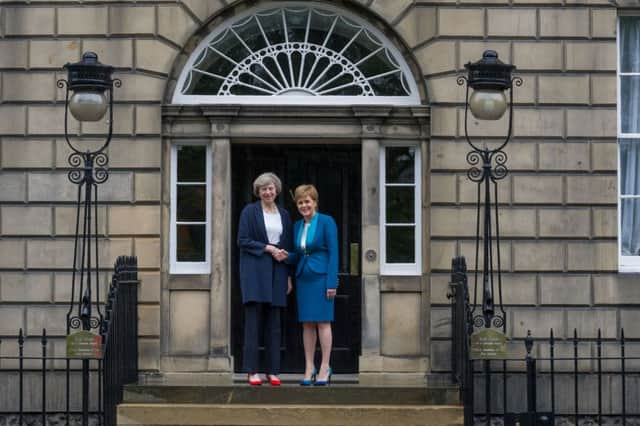Leader: Hard Brexit test to come for May and SNP


But the early glimpses of the terrain will be for many in Scotland as disconcerting as the fog that obscured it. On the timetable she is seeking to activate Article 50 of the European Treaty by the end of March next year, setting in motion negotiations to secure a UK departure from the EU by March 2019. As for the type of exit, both in tone and in content, the Prime Minister appeared to lean heavily towards the ‘Hard Brexit’ end of the spectrum.
Two developments now look in prospect. The first is determined opposition from the SNP administration which could see the Scottish parliament seeking to frustrate the EU separation process by voting it down at Holyrood, thus triggering a constitutional clash with Westminster. The second is equally determined opposition at Westminster itself, with Labour, Liberal Democrat and some pro-Remain Conservative MPs set to challenge the Bill to revoke the 1972 European Communities Act. Nor is such legislation likely to enjoy a smooth passage through the House of Lords.
Advertisement
Hide AdAdvertisement
Hide AdThe tone and phraseology of Mrs May’s speech yesterday would not, with minor amendments have been amiss in an SNP speech on independence. “We are”, she declared, “going to be a fully independent, sovereign country… no longer part of a political union with supranational institutions that can override national parliaments and courts. That means we are going, once more, to have the freedom to make our own decisions on a whole host of different matters… “
And on immigration specifically, she added, “We will decide for ourselves how we control immigration. And we will be free to pass our own laws.”
It is a stance that sets her directly at odds with the stipulations of the European Single Market on free movement of labour. Across thousands of businesses, and even among those who voted ‘Leave’ there are many who would be distinctly unhappy at the prospect of walking away from the Single Market. This is the very issue on which the SNP administration is most exercised.
The prospect of a ‘Hard Brexit’ walk-out from the Single Market – if this indeed what it comes to – could spark a ferocious war between Holyrood and Westminster. Under the Sewel Convention, Holyrood must give its consent when Westminster passes legislation that touches on areas that are devolved to Scotland. Holyrood’s Europe minister Mike Russell pointed to three votes in the Scottish parliament in the last four weeks on European matters – all of them in favour of the single market.
But the road ahead is by no means clear-cut for the SNP. Mr Russell also called for greater involvement for the devolved administrations in the “meat” of Brexit negotiations and cited areas such as fishing and agriculture. The SNP cannot simultaneously work to veto the Brexit process and at the same time seek to secure a Scottish input to the details of Brexit departure. Fog here has to lift, too.